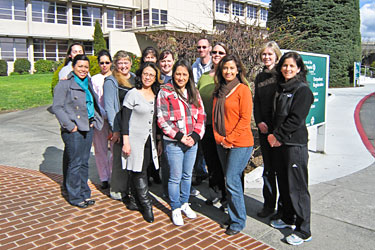Learn More About PUC
Nursing Program Expands in Napa
By Lainey S. Cronk on February 25, 2010
Share this

For years, nursing students from Pacific Union College have been traveling the 30 miles to Queen of the Valley Medical Center (QVMC) for clinical rotations and, eventually, for job opportunities. So when QVMC set a goal to achieve "Magnet Status" by 2013 with 100 percent of their nursing leaders and 65 percent of staff nurses holding at least a Bachelor of Science in Nursing degree (BSN), a collaboration with PUC was natural. "We have had a long history of working with the Queen," says PUC nursing department chair Shana Ruggenberg. "And we have similar missions; we both come at this from a religious mission perspective."
Several other schools wrote proposals for providing an on-site RN-to-BSN nursing program at QVMC, but PUC's was selected to begin last year. The PUC nursing department provides the students with all the core upper division nursing courses in one-night-a-week classes, with religion courses completed on two full Sundays. QVMC provides classrooms in their corporate center in Napa and tuition support for their employees. Of the 17 students currently enrolled in the program, most are already working at QVMC. The purpose of this program, which is similar to another PUC offers in Fairfield, is to give these nurses a chance to complete a degree without quitting their jobs.
"I have tried several times to go back and finish my BSN over the years," explains Lynette Starnes, who is now more than halfway done with the program. "Each time God closed the door. When this opportunity came up with the ease of the once per week classes and the educational money that the Queen is providing it didn't take a brain surgeon to figure out this was finally my open door."
Another student, Roxanne Renshaw, explains that this program was "a great opportunity to obtain a goal I made when I graduated with an associates degree in nursing way back in 1996. I was the one that could not afford a BSN degree program back then. The program allows this goal to become reality for me."
While the program is a unique opportunity for students such as Starnes and Renshaw, it certainly isn't easy. Many students are juggling full-time jobs, families, and now a challenging degree program too. But one of the strengths of the program is that the students go through the whole program together as a group, and they become the strongest support system for each other. "The program is really challenging but it seems that when one of us is in a bad place and discouraged there is someone else that is in a better place to encourage you not to quit," says Starnes. "I love that my co-workers and I are kind of all in it together." In fact, the effect leaks outside of the classroom. "Best so far is the friendship and camaraderie that we have developed between classmates. It is impacting not only our learning but also our working relationships," Starnes says.
Renshaw agrees that the program is no piece of cake. Add a couple of stressful 12-hour ICU shifts to a 5-year-old who needs full attention, a death in the family, and a husband who's pursuing a career opportunity at a distance and you can hardly imagine having the energy for a full course load! "It makes it very challenging to keep up," Renshaw says. "You have to be very grounded in priority setting and have skills to manage many different and difficult things that may come your way. Maybe being an ICU nurse, wife, and mother has in a sense prepared me for the program!"
But for Renshaw, one thing that makes it worthwhile — and feasible — is the instructors, who work hard to make the program both rigorous and realistic. "The instructors are fabulous and skillful at being flexible," Renshaw says. "I feel that [they] are supportive and want me to succeed; they are very engaged in communicating with me anything that I may need to obtain or get done to continue towards that BSN degree."
Starnes agrees that the professors go out of their way to help students. "They are really dedicated to making it work for us," she says.
There are also benefits to simultaneously learning and practicing professionally. "Every day I get to learn something that is making me a better nurse," says Starnes. "Furthermore, I get to put what I learn into practice immediately since I am already working in the profession."
Taken all together, this new collaborative program is a win-win-win. QVMC moves forward toward its Magnet Status goal; PUC has a new opportunity to expand education in the community; and a group of nurses achieves their dreams and receives their degrees.
Latest News
Winter Student Week of Worship: Destined to Experience God
By Marina Maher on February 20, 2026
16 Schools Compete in Pioneers Invitational Academy Basketball Tournament
By Ally Romanes on February 5, 2026
Jordan Delarmente: Christ-Centered Service in the Military
By Marina Maher on January 29, 2026
Charlie: The Aviation Program’s New Vessel for Service and Mission
By Marina Maher on January 26, 2026
